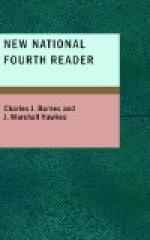“What shall we do, Chitto?” asked my mother.
“Get on horse—he carry you.”
“But my husband; the horse can not carry all three of us.”
My poor distracted mother scarcely knew what to do. All this time father sat like a statue in his chair. A terrible suspicion suddenly entered her mind, and she ran to him.
Placing her hand upon his shoulder, she addressed him in a low tone, and then uttered a fearful shriek, as she staggered backward, saying: “He is dead! he is dead!”
Such was the fact. The shock of the news brought by the little Indian girl was too much, and he had expired in his chair without a struggle. The wild cry which escaped my mother was answered by several whoops from the woods, and Chitto became frantic with terror.
“Indian be here in minute!” said she.
Mother instantly helped me upon the back of the horse and then followed herself. She was a skillful rider, but she allowed Chitto to retain the bridle, and we started off.
Looking back I saw a half-dozen Sioux horsemen come out of the woods and start on a trot toward us.
Just then Chitto spoke to the horse, and he bounded off at a terrible rate, never halting until he had gone two or three miles.
Then, when we looked back, we saw nothing of the Indians, and the horse was brought down to a walk; and finally, when the sun went down, we entered a dense wood, where we staid all night.
I shall not attempt to describe those fearful hours. Not one of us slept a wink. Mother sat weeping over the loss of father, while I was heart-broken, too.
Chitto, like the Indian she was, kept on the move continually. Here and there she stole as noiselessly through the wood as a shadow, while playing the part of sentinel.
At daylight we all fell into a feverish slumber, which lasted several hours. When we awoke, we were hungry and miserable.
Seeing a settler’s house in the distance, Chitto offered to go to it for food. We were afraid she would get into trouble, but she was sure there was no danger and went.
In less than an hour she was back again with an abundance of bread. She said there was no one in the house, and we supposed the people had become alarmed and escaped.
We staid where we were for three days, during which time we saw a party of Sioux warriors burn the house where Chitto had obtained the food for us.
It seemed to mother that the Indians would not remain at Lac Qui Parle long, and that we would be likely to find safety there. Accordingly, she induced Chitto to start on the return.
When we reached our house nothing was to be seen of father’s body; but we soon, discovered a newly-made grave, where we had reason to believe he was buried.
As was afterward ascertained, he had been given a decent burial by orders of Little Crow himself, who, doubtless, would have protected us, had we awaited his coming.




